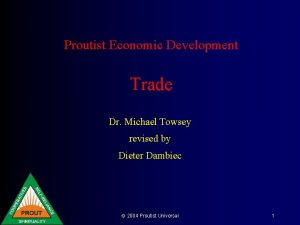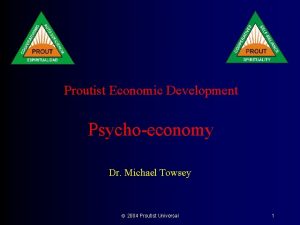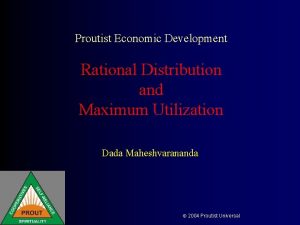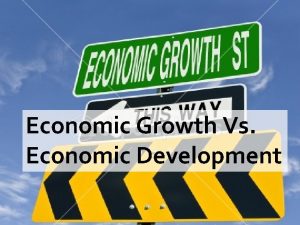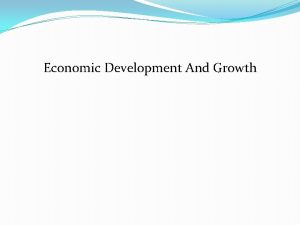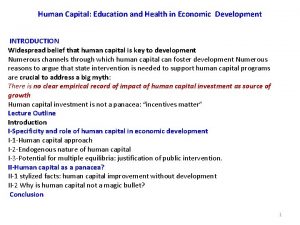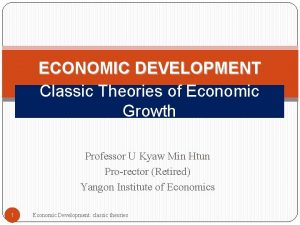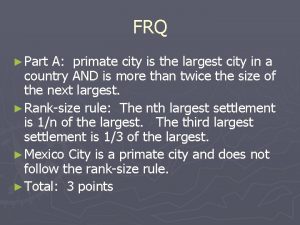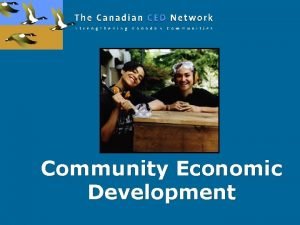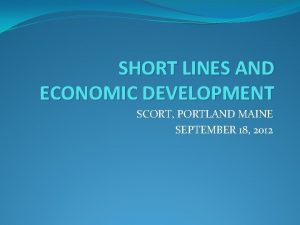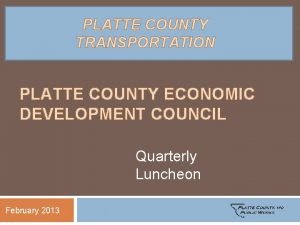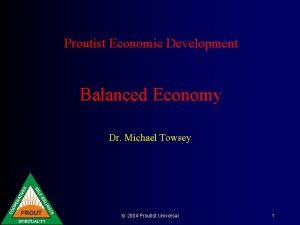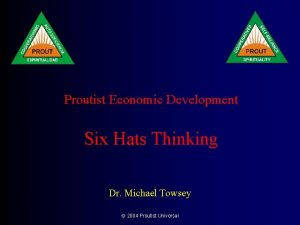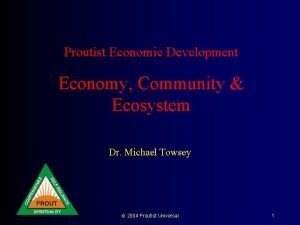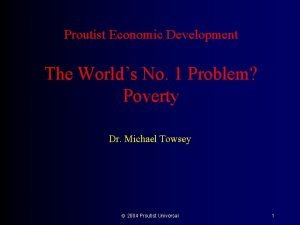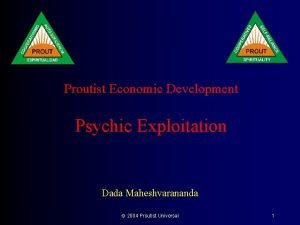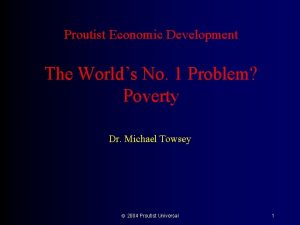Proutist Economic Development Economic Selfsufficiency Dr Michael Towsey
















- Slides: 16

Proutist Economic Development Economic Self-sufficiency Dr. Michael Towsey 2004 Proutist Universal 1

Summary so far • Poverty: caused by the bleeding of wealth from a community. • Answer: economy must be strongly linked to community and environment. • People‘s Economy – Prout‘s answer to poverty. • Samaj strategy - identify socio-economic units - the smallest communities that have potential to be economically selfsufficient. • This presentation: How to achieve economic self-sufficiency? Dr. Michael Towsey Proutist Universal 2

Economy as a living system Semi-permeable trade border imports balance exports Requires: • Self-sufficiency in the essentials of life • Regulated trade • Maintain internal economic balance despite fluctuating global economy • Decentralisation Dr. Michael Towsey Proutist Universal 3

Fundamental principle • Prout separates political power from economic power. • Separation of powers: – legislature; – executive; – judiciary. • And audit also to be independent. • Political centralisation & economic decentralisation. Dr. Michael Towsey Proutist Universal 4

Political and economic powers • Political power is vested with ethical leaders. . . • But. . . economic power is vested with local people. • Political representatives concerned with overall social welfare. . . for the good and happiness of all. • But. . . local people plan their strategy in the socioeconomic units. Dr. Michael Towsey Proutist Universal 5

Starting objective of decentralised economy • Guarantee of minimum necessities for all persons: – food (including water); – clothing; – housing; – medical care; – education. • Through increased purchasing capacity. Dr. Michael Towsey Proutist Universal 6

Minimum necessities of life • It is a fundamental human right. • But also a collective necessity, because easy availability of minimum requirements (through adequate purchasing capacity) will increase the all-round welfare of society. • Decentralised economy is required for self-sufficiency. • What are the features / characteristics of a decentralised economy? Dr. Michael Towsey Proutist Universal 7

1 st feature of decentralised economy • All resources in a socio-economic unit (Venezuela) should be controled by local people (Venezuelans). • Local people should control economic decisions. • Economic planning is bottum up, not top down. • The goal: economic self-reliance. • Method: to develop the local economy using local resources, establish local savings, use local labour, develop local entrepreneurs and local markets. Dr. Michael Towsey Proutist Universal 8

1 st requirement and question of foreign investment? • Foreign investment: – not opposed to Direct Foreign Investment. • In the interim, multi-national corporations can invest and get a reasonable rate of return. . . BUT: – project must be in the interests of local community; – there must be technology transfer (Japan and China); – investors cannot withdraw capital, at will; – investors cannot control local resources outright; – investors must work within development plan of the local economy. – IMF article 6: every country has right to impose capital controls. Dr. Michael Towsey Proutist Universal 9

2 nd feature of decentralised economy • Production should be based on consumption demand not profit motive. • Negative Example 1: Planting of cash crops for export (foreign currency) rather than food crops for local consumption. • Negative Example 2: Big banks in Australia closed rural branch offices. The branch offices were not making a loss but can make more profits elsewhere. • Negative Example 3: Profit motive has created a junk food industry which is bad for health (diabetes and obesity), at the public cost. • Positive Example: Cuba in the 1990 s. Dr. Michael Towsey Proutist Universal 10

3 rd feature of decentralised economy • Production and distribution organised primarily through cooperatives. • Cooperatives and decentralised economy go hand in hand. • Cooperatives need protection from multi-national corporations. • In Prout‘s industrial system cooperatives are established as the norm (other than in areas of public key industries or private small businesses). • Industry is to be optimally developed and with maximum modernisation. Dr. Michael Towsey Proutist Universal 11

4 th feature of decentralised economy • Local people have first preference to be employed in local economic enterprises. • Who is a foreigner? Who is a local person (eg Venezuelan)? • A Venezuelan (local) is a person who has merged their socio-economic interests with the socio-economic interests of Venezuela. – Determined by factors such as where their money goes, length of residence, contribution to community. – Has nothing to do with ethnicity, religion or place of birth. Dr. Michael Towsey Proutist Universal 12

4 th requirement and question of foreign workers? • Where a floating population exists in a particular region, the outflow of capital remains unchecked and the economic development of the area is undermined. • Floating population: foreigners cannot work in a country such as Venezuela just to send money outside. • Cooperatives in Prout will have local members as shareholders and workers (receiving dividends and wages / salary). Dr. Michael Towsey Proutist Universal 13

5 th feature of decentralised economy • No import of commodities that can be made within Venezuela. • Venezuela should NOT depend on imported raw materials for its development – use local raw materials wherever possible. • Encourage import substitution (ie strategy to replace imports with domestically produced substitutes). • National security requires security of food and medicines (eg insulin) and reserves are required to be built up. Dr. Michael Towsey Proutist Universal 14

5 th requirement and question of exports? • Export surplus and specialty goods. • Exports must be made from raw materials of the country (process and value add to raw materials internally). • Export of raw materials is a sign of a weak economy – always value-add before export. • Barter trade wherever possible – can set up sophisticated clearing houses to achieve this internationally (much international trade is actually barter already). • Establish trade blocs between equally developed countries. Dr. Michael Towsey Proutist Universal 15

Final comments • Economic decentralisation does not reduce economic potential. • Rather, it removes poverty because wealth increases everywhere – so there is no waste of economic potential. • Every economic sector strives for maximum development AND economic decentralisation. • Example: within Venezuela, local regions would strive to be self-sufficient in: basic food, drinking water, irrigation water, required clothing, building products for housing, essential medical care, educational needs, communications, power and other utilities. Dr. Michael Towsey Proutist Universal 16
 Michael towsey
Michael towsey Michael towsey
Michael towsey Proutist economics
Proutist economics Economic growth vs economic development
Economic growth vs economic development Prof. meier and baldwin
Prof. meier and baldwin Lesson 2 our economic choices
Lesson 2 our economic choices Wake county economic development
Wake county economic development Economic social development
Economic social development Northern waterfront economic development initiative
Northern waterfront economic development initiative Human capital education and health in economic development
Human capital education and health in economic development Economic social development
Economic social development Hollis chenery
Hollis chenery 2 positive effects of primate cities
2 positive effects of primate cities Canadian community economic development network
Canadian community economic development network Ward economic development corporation
Ward economic development corporation Scortportland
Scortportland Platte county economic development
Platte county economic development
